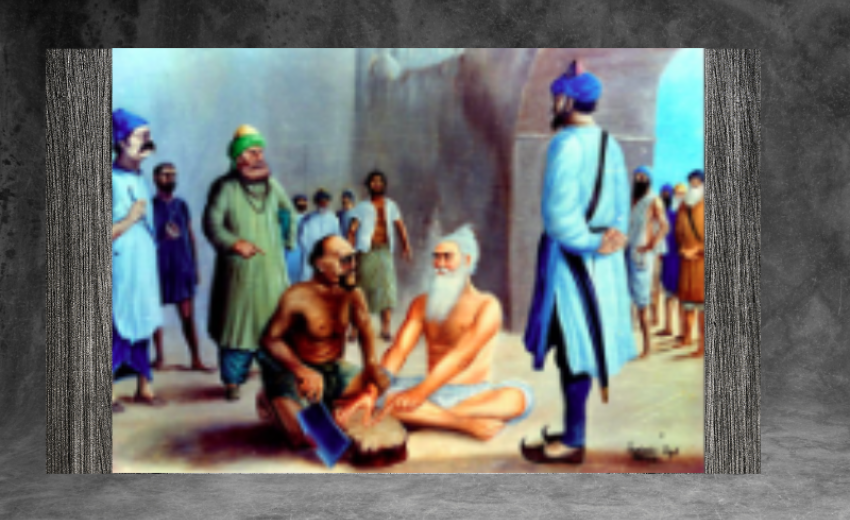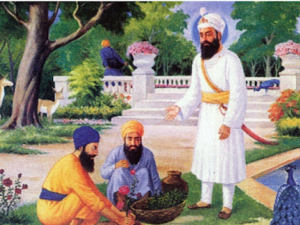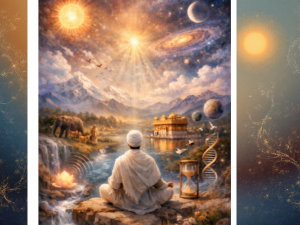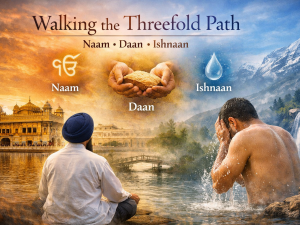The autumn of 1734 cast long shadows across the courtyard of Lahore Fort. Bhai Mani Singh Ji sat in meditation within his cell, his ninety-year-old frame upright despite the chains that bound his feet. The events that led to his imprisonment played in his mind like scenes from a distant dream: the Diwali celebration at Harmandir Sahib, the Jizya (tax) demanded by Zakaria Khan for the privilege of gathering, and his decision to organize the festival despite knowing the consequences.
Through the barred window, he could hear the distant sound of azaan mixing with the whispered prayers of Sikh pilgrims who had secretly gathered outside the fort walls. His lips moved silently, reciting the sacred verses that had become his constant companions over five decades of service to the Guru's mission.
A young guard, barely eighteen, approached with the evening meal. "Bhai Sahib," he whispered in broken Punjabi, "my mother was healed at your gurdwara once. She says you are a holy man. Why don't you just pay the tax and go free?"
Mani Singh's eyes opened slowly, holding depths of compassion that seemed to illuminate the dim cell. "Beta, some things cannot be bought or sold. The right to worship the Creator, to gather in His praise, this is not something any earthly ruler can tax."
******
The conversation transported him back to his youth, when he first approached Guru Gobind Singh Ji with burning questions about the nature of true spiritual strength. He had been serving as a scribe, copying the sacred texts, when doubt began to gnaw at his heart.
"Guru Ji," young Mani Singh had asked during one of their private sessions, "I see the Khalsa face torture and death with such courage. How does one develop such fortitude? What transforms an ordinary person into someone who can face the sword without flinching?"
Guru Gobind Singh had paused in his dictation, his eyes reflecting the wisdom of the ages. "Listen carefully, Mani Singh. The secret lies in understanding these words: 'ਜੋਗ ਜੁਗਤਿ ਸੁਨਿ ਆਇਓ ਗੁਰ ਤੇ,' I learned the method of true spiritual union from the Guru."
The Guru continued, "True strength comes not from the body, but from aligning yourself completely with the Divine will. When you make your five senses, sight, hearing, touch, taste, and smell, serve only the One Creator, they become your disciples rather than your masters. When your ten organs of action and knowledge bow to the Eternal Truth, you become the master of your own spiritual destiny."
"But Guru Ji, the pull of maya is so strong. The mind rebels..."
"This is why the Shabad is your anchor," the Guru had replied, placing his hand on Mani Singh's head. "Let the divine word be your constant companion, 'ਦੀਖਿਆ ਗੁਰ ਕੀ ਮੁੰਦ੍ਰਾ ਕਾਨੀ ਦ੍ਰਿੜਿਓ ਏਕੁ ਨਿਰੰਕਾਰਾ, ' the Guru's teaching becomes your earring, and through it, you establish the One Formless Lord within yourself."
******
Now, decades later, those teachings faced their ultimate test. The heavy doors of his cell creaked open, and Zakaria Khan entered with his retinue, their silk robes and jewelled turbans a stark contrast to Mani Singh's simple white garments.
"Bhai Mani Singh," Khan began, his voice carrying the weight of imperial authority, "you have served as the custodian of the holiest Sikh shrine. You are learned and respected by thousands. Yet you choose to defy the Emperor's decree over a mere celebration. Why risk everything for one day of the festival?"
Mani Singh rose slowly, his chains clinking softly. Despite his age and bondage, his presence filled the small cell. "Huzoor, you speak of one day, but this is about the eternal right of the soul to commune with its Creator. The tax you demand is not on gold or silver, but on the very act of worship itself."
"The Emperor's law is clear," Khan continued, his tone hardening. "All religious gatherings of Kafirs must be sanctioned and taxed. Your defiance has encouraged others to rebel. Accept Islam, and not only will you be freed, but your conversion will bring thousands into the fold of the true faith."
Around them, the other prisoners, Sikhs arrested for participating in the Diwali celebration, listened intently. Their faces showed fear mixed with awe as they witnessed their beloved leader face the Khan's threats.
"Khan sahib," Mani Singh replied with unwavering calm, "you offer me freedom from these chains, but I have already found freedom from the bondage of fear and spiritual ignorance. As the Guru taught: 'ਪੰਚ ਚੇਲੇ ਮਿਲਿ ਭਏ ਇਕਤ੍ਰਾ ਏਕਸੁ ਕੈ ਵਸਿ ਕੀਏ,' I have gathered my five disciples (senses) and placed them under the command of the One."
Khan's face flushed with anger. "You speak in riddles, old man! Tomorrow at dawn, you will face the executioner. Joint by joint, limb by limb, you will be separated from this body you refuse to abandon for the true faith. Is your stubborn pride worth such agony?"
The cell fell silent except for the distant sound of evening prayers. Some of the younger prisoners began to weep quietly, and even the guards seemed uncomfortable with the brutality that had been decreed.
Mani Singh closed his eyes and began to recite: "ਦਸ ਬੈਰਾਗਨਿ ਆਗਿਆਕਾਰੀ ਤਬ ਨਿਰਮਲ ਜੋਗੀ ਥੀਏ,” When the ten ascetics (five senses and five sense actions) become obedient to the Divine command, then one becomes the pure practitioner of true spiritual discipline."
When he opened his eyes, they blazed with an inner fire that made even the Khan step back. "Khan sahib, you threaten to separate me from this body, but the Guru has already taught me that the body is merely a vessel. My ten faculties, the organs of action and knowledge, have already learned to obey only the Divine command. You can break the pot, but you cannot touch the light it contains."
Khan's hand moved to his sword hilt. "Fool! Do you think your God will save you from tomorrow's ordeal?"
"My God doesn't need to save me," Mani Singh replied with serene conviction. "My God has already liberated me. As the Guru taught: 'ਭਰਮੁ ਜਰਾਇ ਚਰਾਈ ਬਿਭੂਤਾ ਪੰਥੁ ਏਕੁ ਕਰਿ ਪੇਖਿਆ,' I have burned away all doubts and smeared their ashes on my body, seeing this as the only path to liberation."
******
That night, as the prisoners huddled together in the cold, a young Sikh named Jassa Singh approached his elder. "Bhai Sahib, I'm afraid. My faith wavers. How do you remain so calm knowing what awaits you?"
Mani Singh placed his shackled hands on the young man's head. "Beta, fear is natural, it shows you are human. But remember what the Guru taught us: when you truly control your five senses and ten organs, placing them in service of the Divine, even death becomes just another form of seva."
"But the pain tomorrow..."
"Pain is temporary, beta. The body will suffer, but the soul that has merged with the Divine knows no permanent pain. When you truly understand that 'ਨਉ ਖੰਡ ਪ੍ਰਿਥਮੀ ਇਸੁ ਤਨ ਮਹਿ ਰਵਿਆ, ' the Creator who pervades all nine realms also dwells within this body, then death becomes just another doorway."
Throughout the night, Mani Singh continued to counsel his fellow prisoners, sharing stories of the Gurus' sacrifices, reciting sacred verses, and demonstrating through his own unshakeable peace that spiritual mastery was not merely a philosophy but a lived reality.
******
As dawn broke over Lahore, the executioner's party arrived with their terrible instruments. Khan made one final offer: "Last chance, Bhai Mani Singh. Speak the kalma, accept the Emperor's faith, and walk free. Your followers will understand, they too value life over pride."
Mani Singh stood tall, his voice carrying across the courtyard where hundreds of Sikhs had secretly gathered despite the danger. "Khan sahib, you offer me freedom from this body's pain, but I have already found freedom from the bondage of spiritual ignorance. You ask me to deny the Divine that dwells within me and within all creation. This I cannot do, for it would be to deny the very essence of my existence."
As the execution began, witnesses later recounted that Bhai Mani Singh continued to recite Gurbani, his voice growing stronger with each verse. His face remained serene, his eyes fixed on some distant vision of the Divine. When the executioner hesitated, disturbed by the old man's composure, Mani Singh encouraged him: "Beta, do your duty. You are but an instrument in the Divine play."
The brutal process took hours, but observers noted that Mani Singh's spiritual composure never wavered. Joint by joint, he was separated from his physical form, yet his spirit seemed to soar higher with each cut. He had become a living embodiment of the Guru's teaching: the five senses and ten organs completely surrendered to the Divine will, doubt burned away, the ego dissolved into the Eternal.
******
Young Jassa Singh, who had been spared due to his youth, emerged from the prison a transformed man. The Khan, deeply disturbed by what he had witnessed, quietly allowed the remaining prisoners to go free. He had expected to break a rebel; instead, he had witnessed the unshakeable power of spiritual realization.
Years later, Jassa Singh would tell his own students: "I saw a man who had truly mastered the Guru's teaching. His five senses served only the Divine, his ten ascetics (five senses and five sense actions) obeyed only the Eternal command. He showed us that when you burn away doubt and embrace the Shabad completely, even the most excruciating death becomes a celebration of the soul's victory over matter."
The story of Bhai Mani Singh's martyrdom spread throughout Punjab and beyond, inspiring countless others to deepen their own spiritual practice. His example became a beacon, showing that the path of true discipleship, controlling the senses, surrendering the ego, and embracing the Divine word, was not just mystical theory but a practical way to achieve unshakeable strength in the face of any trial.
In Gurdwaras across the world, his story continues to be told, reminding new generations that the same Guru who guided Bhai Mani Singh still offers the same teachings today. The only question remains: are we willing to listen and obey, or will we continue to follow our own fancies?
The flame that death cannot extinguish continues to burn in the hearts of all who dare to walk the path of complete surrender to the Divine will.
******
Reference
- ਜੋਗ ਜੁਗਤਿ ਸੁਨਿ ਆਇਓ ਗੁਰ ਤੇ ॥ ਮੋ ਕਉ ਸਤਿਗੁਰ ਸਬਦਿ ਬੁਝਾਇਓ ॥੧॥ ਰਹਾਉ ॥ ਨਉ ਖੰਡ ਪ੍ਰਿਥਮੀ ਇਸੁ ਤਨ ਮਹਿ ਰਵਿਆ ਨਿਮਖ ਨਿਮਖ ਨਮਸਕਾਰਾ ॥ ਦੀਖਿਆ ਗੁਰ ਕੀ ਮੁੰਦ੍ਰਾ ਕਾਨੀ ਦ੍ਰਿੜਿਓ ਏਕੁ ਨਿਰੰਕਾਰਾ ॥੧॥ ਪੰਚ ਚੇਲੇ ਮਿਲਿ ਭਏ ਇਕਤ੍ਰਾ ਏਕਸੁ ਕੈ ਵਸਿ ਕੀਏ ॥ ਦਸ ਬੈਰਾਗਨਿ ਆਗਿਆਕਾਰੀ ਤਬ ਨਿਰਮਲ ਜੋਗੀ ਥੀਏ ॥੨॥ ਭਰਮੁ ਜਰਾਇ ਚਰਾਈ ਬਿਭੂਤਾ ਪੰਥੁ ਏਕੁ ਕਰਿ ਪੇਖਿਆ ॥
Jog jugat sun aa-eo gur te. Mo kau Satgur shabad bujhaa-eo. ||1|| Rahaa-o. Nau khand prithmee is tan meh raviaa nimakh nimakh namaskaaraa. Deekhiaa Gur kee mundraa kaanee drirhio ek Nirankaaraa. ||1|| Panch chale mil bhae ikatraa, ekas kai vas keeye. Das bairaagan aagiaakaaree, tab nirmal jogi thee-e. ||2|| Bharam jaraa-e charaa-ee bibhutaa, panth ek kar pekhiaa.
I have come to learn about the method of union (Yoga) through the Guru. The True Guru has made me understand it through the Shabad (Divine Word). ||1||Pause||. The nine continents of the earth are contained in this body; within it, the Divine pervades. At every instant, I bow in reverence. The initiation of the Guru is the sacred ear ornament (symbolic of commitment), and I have enshrined the One Formless Lord firmly in my consciousness. ||1|| The five disciples (senses) have come together and are now under the control of the One (soul). When the ten organs of action and perception become detached and obedient, only then does one become a pure Yogi (spiritualist). Having burnt away doubt and applied the sacred ash (of wisdom), I behold the One Path (to liberation) before me. (M. 5, SGGS, 208).





